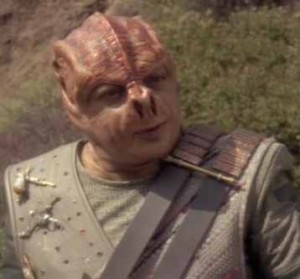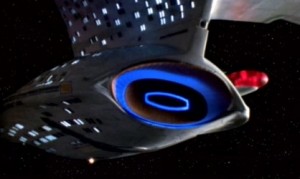Babylon 5 creator J Michael Straczynski has a piece of trivia he likes to repeat in interviews:
There was a bulletin board at NASA that for many years had a big sign on it that said, “Never apply a Star Trek solution to a Babylon 5 problem.”
I’m not sure if the story is true, but I love the maxim. For those of you who don’t speak geek, this basically means, “Don’t use a simple solution for a complex problem.”
Star Trek episodes were mostly self-contained, and the problems usually forgotten by the time they set course for the next star system. Babylon 5 was heavily serialized, with story arcs unfolding over the course of years.

I have this idea to write some Darmok fan fiction, dramatizing the stories that the Tamarians mention in the most basic way. "It was another beautiful morning in Shaka. Little did the people know, it was to be their last..."
The metaphor actually reminds me of the classic Next Generation episode, “Darmok.” This is the one with the Tamarians, a race which communicates only through metaphors. A Tamarian wouldn’t say, “That girl totally rejected me.” He’d say, “Shaka, when the walls fell,” and his friends would instantly understand and buy him a beer.
(OTI Aside: But if the Tamarians ONLY speak in metaphor, how did they tell the story of Shaka in the first place? I guess with more metaphors?)
To someone outside the culture, like Picard, Tamarian speech is completely incomprehensible. But if you grew up hearing those stories over and over again, mentioning Shaka invokes a flood of associations and emotions. Similarly, someone who’s not a sci-fi geek won’t know what a Star Trek solution is, but people who know the show will smile and nod.
But it’s not just about coding your speech for the sake of tribalism. Using pop culture as shorthand allows you to express a complicated idea with relatively few words. A true “Star Trek solution” is more than just a simple fix. It’s a simple fix using unrealistically convenient technology. Remember all those times the Enterprise used the deflector shield to emit tachyon pulses, recalibrated the phasers to match the frequency of the sub-space distortion, or did God knows what with the tractor beam? No matter how impossible the problem, it was always resolved in a few keystrokes. (I’m basically referring to TNG here. On the original series, most problems were resolved via jump kicks and/or inter-species lovemaking.)
Similarly, Babylon 5 problems are not merely complex. They are problems that require negotiation, politics, and diplomacy. A deflector shield isn’t going to help you in Babylon 5. What you really need is a nice dark back room to cut a deal in.
To me, a great real-world example of a Star Trek solution to a Babylon 5 problem is online dating. Falling in love is supposed to be a combination of serendipity, lots of blind alleys, and a slow courtship. It might take years, or a lifetime. But a site like Match.com promises to make it easy: just give it some personal information and you’ll be emailing your soulmate in no time. Online dating takes a tremendous interpersonal challenge and offers a technical fix. Commander Data would approve.
A lot of real world situations can be described via Star Trek and Babylon 5. But I also find it useful to invoke another sci-fi touchstone: Star Wars. A Star Wars problem is that you are at war with a much larger, much more powerful force that CANNOT be negotiated with. A Star Wars solution is to attack the problem head-on.

A textbook Star Wars solution.
Example 1: “The president is naïve to pursue diplomacy with North Korea. That’s a Babylon 5 solution to a Star Wars problem.”
Example 2: “If you take my red stapler, I will light the building on fire. That is my Star Wars solution to a Babylon 5 problem.”
I have a theory that all problems have a Star Trek solution, a Babylon 5 solution, and a Star Wars solution. For instance, let’s say you can’t pay your rent. The Star Trek solution is to try some desperate get-rich-quick scheme to make the money overnight. The Babylon 5 solution is negotiate a lower rent with your landlord. The Star Wars solution is to burn down your landlord’s house, preferably by throwing a Molotov cocktail through a tiny exhaust port.
To take a pop culture example, there’s Jay-Z getting pulled over by the cops in his song “99 Problems.” The Star Trek solution is to get a radar detector, thus allowing you to avoid the cops in the first place. The Babylon 5 solution is to talk your way out of the ticket, and if that fails, to fight it in court. The Star Wars solution is to lead the cops on a high speed chase, and inadvertently park your car inside a giant worm.

Seeing five lights would be a 24 solution to a Star Trek problem. Think about it.
So here’s my question: what other TV shows, sci-fi or otherwise, have stereotypical problems and solutions we can use for metaphors? Not all of them work well. I wanted to use “Quantum Leap problem” to refer to a situation where you’re forced to obey strict rules you don’t understand. But nobody would understand that was the aspect of Quantum Leap I was going for. To most people, a “Quantum Leap problem” would mean getting lost in time, or stuck in someone else’s body.
There are also shows with clear “solutions,” but no clear “problems.” For instance, we all know what a MacGuyver solution is. (It’s basically a non-electrical version of the Star Trek solution.) But what is a MacGuyver problem? It’s not formulaic enough to make a good metaphor. Similarly, a Sliders solution would be to lie low until you can run away from the problem. A Sliders problem is harder to define.
Offer your suggestions for pop culture-based metaphors in the comments. You can also try to put them into practice. For example: “Bones is nothing but Star Trek solutions to Law & Order problems.”


I love this, I’m going to be spending the rest of the day coming up with these.
Glee: A High School Musical solution to a Gossip Girl problem.
I propose that “West Wing solution” be shorthand for appealing to your opponent’s infinite honor and patriotism.
I definitely think Scooby Doo has very well defined problems and solutions. The problem is always some unidentified force (generally attempting to impose authority through a fear-creating constructed disguise) and using that constructed superiority/anonymity for personal benefit or revenge.
A Scooby Doo solution has two components – process and result. The solution process involves maintaining a safe but intrusive distance (through a delicate balance of searching, fleeing, and cowering in barrels) until the force commits an error. The ultimate solution result is always the simple proper identification of the force. Which solution you’d be referencing would depend on the context.
Of course, this metaphor also has the additional benefit of being condescending, as it seems to suggest that the problem is trivial, juvenile, or simplistic.
An easy example of a Scooby Doo problem is the show Pretty Little Liars, but that’s more literal than metaphorical. A more stretched metaphor might be that the war in Iraq is a Star Wars solution to a Scooby Doo problem.
Hmmmn can I suggest that be an article for the politics section? Nixon’s presidency started the same year that Scooby Doo did, FYI ;)
How about a House solution. Where you come up with three incorrect guess through cruel tests before having an epiphany and determine the correct answer without any medical confirmation.
The House problem is that you don’t know what the problem is.
but it sure as hell isnt lupus
Also, a Jeeves and Wooster solution (staying on Hugh Laurie) where Stephen Fry steps in and solves everything.
I want a Jeeves and Wooster solution to all my problems.
Numb3rs is a 3-2-1-Contact solution to a 24 problem.
“There’s an impending threat to national security. Wait, I’ve got a formula for that!”
I am high fiving you for the 3-2-1 contact reference.
and thats all I have right now
The Wire problems are large systemic societal ills that are so complex and entrenched that most seeming solutions make them worse.
The Wire solutions involve living within the ruined system as well as you can, making small improvements when possible. If you try a think-outside-the-box, system-exploiting solution (Hamsterdam; hoax serial killer; legitimate real estate investment), expect trouble before the end of the season, because those things don’t work.
Question: what are those Hamsterdam solutions called? That is, in what fictional universe do those sorts of solutions usually work?
A The Wire solution to a Star Wars problem would be moving to a more pleasant Empire-controlled planet, finding a girlfriend, and occasionally using a Jedi mind trick to keep local thugs from roughing up the locals.
Another take on it is that The Wire is about how enmeshing people in institutions dehumanizes them and greatly reduces not just their agency, but they way they think about their agency.
So, a good example of a The Wire solution to a Star Wars problem would be Wyclef Jean getting elected President of Haiti and ending up totally mired in politics and incapable of even putting togeher a charity benefit.
Or else it would mean Luke joins the rebel alliance to fight the Empire, but they put him in charge of updating spreadsheets that keep track of how many planets are destroyed by the Death Star. He gets the plans from R2-D2 and he files them with Admiral Ackbar’s assistant, but the assistant never passes them along, so the Death Star destroys Yavin 4 and Luke gets dinged for the alliance not hitting their numbers. Then Billy Dee Williams kills Grand Moff Tarkin and we all briefly feel better about ourselves.
Great article. Superb comment. Just spit whiskey on myself.
Norton, McAfee, etc. are Star Wars solutions to a Terminator/Matrix problem, whereas not looking at internet porn is a Sesame Street solution to the same problem.
@DrSylvan
I was thinking about the West Wing when reading this article, as I’m not a nerd and have therefore never watched Star Trek or Babylon 5. I think a West Wing solution is a little more complex than you give it credit for.
A West Wing problem is one where you know what the right thing to do is. Based on your (liberal) concept of right and wrong, you absolutely know what you should do. The only problem is that the antagonistic force- republicans -thinks that your obviously right solution is wrong, and are trying to stop you. It’s a problem in which the right thing to do is incredibly difficult and unpopular.
The West Wing solution is to ignore the long term consequences and do what your heart is telling you to. The American President uses this solution, and was not surprisingly Sorkin’s political forerunner to The West Wing. Note: many West Wing episodes do not use West Wing solutions, and everyone is sad at the end. They have to compromise and give in to republican demands, and this is thought of as a defeat. But most of the time the West Wing solution gets shit done. Maybe Obama should try it sometime.
With The West Wing, you have to distinguish between Seasons 1-4, when Aaron Sorkin was involved in the show, and Seasons 5-7 when he wasn’t. The incidence of compromise seemed to increase dramatically.
I disagree with your description of a west wing solution.
The solution isn’t to ignore the long term consequences, because based on your utter moral correctness, the long term consequences will always be good, but the short term consequences will often be bad or at least inconvenient.
For instance, the Stackhouse Filibuster. A good bill is being delayed by an old congressman who wants to make it even better, and all of the characters are being forced to hold off leaving for vacation. The easy path would be to let Stackhouse drop from exhaustion, and pass the bill and leave for vacation, but the West Wing solution is to instead reinforce the senator, and enlist other filibusterers to kill the good bill, so that you can come back and pass a better bill.
Short term consequence: You have to stay in the office over vacation, Other senators hate you for making them stay.
Long term consequences: The best bill ends up being pass.
Also note that a common component to a West Wing solution is a process of defining the problem, because most problems arise with some level of misunderstanding at the beginning, and have to be analyzed before the correct solution is evident. You might even call this unmasking the problem, and thus a west wing solution would include a Scooby Doo solution to be complete.
This observation could also be made about a Babylon 5 solution, because usually the first component of it is a failed or aborted attempt at a star wars solution.
Overkill, possibly drunken: A Karate Kid solution to a Degrassi problem. (Sweep the leg!)
About the snafu re: iPod 4’s antenna location – A Gilligan’s Island solution to an All in the Family problem. (Just hold the coconut in the other hand, meathead!)
Dr. Laura’s exit from the airwaves: A Jon and Kate solution to a Little House on the Prairie problem. (I could have chosen to apologize to everyone and learn my lesson, but I’m leaving instead.)
Steven, the airline steward who wouldn’t – A Cheers solution to a MASH problem.
Just some thoughts.
Leverage.
Problem: All-powerful corporation or person is hurting/threatening the little guy.
Solution: Through a complicated series of steps in a master plan trick the villains into their downfall.
I wanted to suggest Burn Notice but I can’t see how accents and explosions could help in everyday situations.
I was thinking of Burn Notice too. I haven’t seen it for ages (it’s on incredibly late here) but was thinking it might be a Babylon 5 solution followed by a Star Trek solution followed by a Star Wars solution.
@cat
Burn Notice: a Jason Bourne solution to an A-Team problem?
Well, we can safely say that a Battlestar Galactica problem is the failure of a basic need in a time of desperation (read: every episode of the first season). As for a Battlestar Galactica solution, that I’m less sure of. And as for a Star Trek solution to that BSG problem, the unfeasibility of this is what drove RDM from Voyager to Battlestar in the first place.
I would say that the Battlestar Galactica solution is that there is no solution- no matter how hard you try to out run or fight the robots that look like you, they just keep coming.
I guess I can’t rebut that without spoilers. It’s certainly a good way of conceiving it.
I’d suggest instead that a Battlestar Galactica problem is a dire threat that is nonetheless extremely difficult to understand or characterize, and a Battlestar Galactica solution is one that seems necessary, but that involves great effort and loss, leaves one morally compromised, and doesn’t really fix the problem.
Thus, following Robert Q’s lead, the War in Afghanistan is a Battlestar Galactica solution to a Battlestar Galactica problem.
Doctor Who: A Star Trek solution (unrealistically convenient solutions) to a Superman problem (evil force wanting to control Earth)?
High fructose corn syrup is a Soylent Green solution to an Iron Chef problem.
I love science fiction and movies, but for some reason when I read this post I kept thinking about classic children’s lit, e.g., a Huckleberry Finn solution to an Encyclopedia Brown problem.
For example: the war in Afghanistan is a Very Hungry Caterpillar solution to a Where’s Waldo problem.
Snakes on a plane is a Star Wars solution to a Dr. Doolittle problem.
On a different note, can we start a separate thread where we define our cultural metaphors for Talk Like a Tamarian Day.
I’ll start:
“Animal House, when the toga was worn”: a generally good time that may involve some drunkenness and poor decisions
“Maggie, her pacifier taken”: when a familiar element of the environment is removed, leaving an aching desire for completeness
“Matrix, in the lobby”: something that’s undeniably awesome
“Picard, his engines engaged”: when calm is restored and all is right with the world
“Pesci, his groin paint-canned.”
“McGuffin, its location unknown.”
“McGuffin, its location discovered.”
This is really useful for, like, anything. I mean, all Edward Albee’s works are basically Bert-n-Ernie solutions applied to either Tennessee Williams problems or Eugene O’Neill problems. And Eugene O’Neil is little more than Steinbeck solutions for Ibsen problems.
Ayn Rand? Wittgenstein solutions for a Thoreau problem.
James Joyce? A T.S. Eliot solution for a Proust problem.
This shit is awesome! How could we ever have lived without it?
Kim Jong-Il is an Unbeatable Bankzuke solution to a M*A*S*H problem.
I saw somebody today running with double hip-mounted water bottles. That was a Project Runway solution to a Ninja Warrior problem.
Terminator problem: you keep trying to change the future by your actions in the present (or past, depending on your frame of reference), but no matter how hard you try, the apocalypse still happens.
Terminator solution: most of the franchise would have you believe that the solution is to pigheadedly believe that there’s “no fate but what we make,” but the sad truth is that’s just a big fat lie.
In other words, there is no Terminator Solution to a Terminator Problem.
A Star Trek solution to a Terminator problem would be to use the deflector dish to create a rift in the space-time continuum and live out the rest of your life in an alternate universe where Judgment day never happens.
I would say the Terminator problem is that a relentless, nigh-invincible hunter-killer robot is trying to kill you. To me, the whole time travel thing has always seemed secondary to that in the Terminator franchise, at least when they’ve been good.
A Terminator solution is a little less clear — I’d say it leans toward getting your own of whatever is trying to kill you to protect you and kill it first. But that’s T-2, not Terminator, and that’s more of a Mothra solution to a Godzilla problem anyway.
But yeah “Terminator” is a problem, not a solution, generally.
The Expendables: a Rocky Balboa solution to a Rambo II problem.
Mass Effect 2 is a Six Million-Dollar Man/Bionic Woman (depending on your player choice) to a Mass Effect 1 problem.
He’s my solution, attempt, solution Tamarian metaphors
“Keys lost, Monk/Psych arrived and left sad. Star Wars. Room like Death Star.”
“Kids like banshees, Babylon5 failed, Scooby Doo succeeded.” (especially the part where I hid in barrels)
“Wife maelstrom, my Star Trek failed, she loves Babylon5.”
OTI regulars might get this more obscure one
“Computer problem, BSG/V/Alias(?)/Hawaii Five-O rescues me.”
Judge Dredd (or Robocop): A Rambo solution to a Law and Order problem.
The Bourne series: A Rambo solution to a Memento problem. (Not the same amnesia, I know, but similar in the “try to move past a time in your past you don’t quite recall.”)
Moral of the story: Rambo can solve any problem.
Top Chef is a Survivor solution to a The French Chef problem.
American Idol is a Total Request Live solution to a Star Search problem.
X-Files is a Dragnet (or Untouchables) solution to a Kolchak: The Night Stalker problem.
Lost is a Twin Peaks solution to a Gilligan’s Island problem.
My personal favorite:
The War on Terror is a G.I. Joe solution to a This Old House problem. (A G.I. Joe solution meaning a continual “heroic” war on a nebulous enemy that, despite winning every battle, the war can never be truly won in a situation that would probably be better served by coming together and building joint economic interests and wealth.)
I also, I am firmly convinced that everything has an I Love Lucy solution as well as Star Wars, Star Trek and B 5 ones. The I Love Lucy solution varies, but typically involves wacky hijinks by an earnest party that ultimately make everyone look foolish. The best example I can think would be George W. Bush giving Angela Merkel as neckrub; clearly a I Love Lucy solution to a McLaughlin Group problem. (“Issue: Ms. Merkel has a kink in her neck! “) Similarly, The Office is a I Love Lucy solution to daily white collar work.
A Shakespearean comedy solution (crossdressing/ disguises) to a Some Like it Hot problem (limited access).
I’d say Samuel L. Jackson’s characters tend to use Star Wars solutions to solve every problem. Just shoot the muthaf***a.
Fringe is a Star Trek solution to an X-Files problem.
Implicit in the way the issue is originally framed is the problem types are best solved by the same solution type, that for example a West Wing problem is best solved with a West Wing solution, and any other approach is foolish or at least wrong-headed. I wonder, though, if that is necessarily the case. For example, Hiroshima was arguably essentially a Star Trek solution to a Babylon 5 problem — using some fancy, extremely powerful technology to immediately stop what seemed to be a very difficult war. One can argue about the morality of that action (and I personally think it was extremely questionable), but it is inarguable that it “solved” the “problem” very quickly, and perhaps with less loss of life in the end.
So I wonder under what circumstances it is the case that solutions are best found outside of the problem “type”.
I always read it slightly differently – it’s not that the inappropriate solution won’t work, it’s just that it’s conspicuously mismatched. Like, take the USA’s dependence of foreign oil. This is a Babylon Five problem. The Star Trek solution is “invent cheap safe cold fusion.” That’s not a bad solution, it’s just… I dunno. A cheat code. The reason foreign oil is a Babylon Five problem is that there’s no easy out. Anything we do is going to involve compromise and sacrifice, and as a result it’s quite likely that we won’t do anything at all. Cold fusion is a solution that involves no compromise or sacrifice – although I guess you could argue about the hell it would play with the global economy.
And yeah, this has occasionally happened in actual history, although I’m not sure the end of WWII quite qualifies (I say it’s still a Babylon 5 solution because of the moral issues bring up, which wouldn’t typically be a factor in Star Trek). Like, take syphilis. That was a public health problem with tons of social ramifications and no easy fix. Then penicillin happened.
The Mentalist. A show with the problem that people kill. The solution? Figure out who the killer is within ten minutes and spend several days planning out a cunning and very troublesome, resource heavy, and theatrical way of setting him up to reveal himself.
So Mentalist is a Charlie’s Angels solution to a Law&Order CI problem?
I thought of one that I’m surprised no one else has:
A Shawshank problem is that you’re in a hostile, calculated world that punishes you for a situation in which you were originally the victim.
A Shawshank
solutionredemption is where, through tireless hard work, and integrity-filled devotion to the human spirit in the face of dehumanizing cruelty, you obtain comeuppance against the evil that you’ve faced while simultaneously earning yourself well-deserved peace and prosperity.Going to college, becoming an adored leader of a multinational charity, and then showing up at your high school reunion as a hero is a Shawshank solution to teen bullying. A star wars solution would involve a large fistfight, I guess.
My favorite Quantum Leap solution is the one applied to a Halloween costume problem. That is to say, going as Dr. Sam Beckett taking over your person to prevent the awful, awful events that are to unfold. You even get to have conversations with your sidekick Al, whom only you can see.
But then I also like to practice It’s A Wonderful Life solutions to my own Big Lebowski problems, by acting really relieved that things are exactly as they are and should be, so all the customers from my Building & Loan show up to help me come up with the money that the scheming guy in the wheelchair had all along.
a Futurama problem: a problem that arises out of incompetence
a Futurama solution: a solution that arises out of further incompetence
Problem spotted. This only works if you explain the problems and solutions to another person or it’s painfully obvious. I’m sure a lot of these comments would be very amusing if they made any sense to me.
Fear the Reaper is a Ghostbusters solution to a Supernatural problem.
An E.R. problem: Unsuccessful romantic entanglement at the workplace.
An E.R. solution: Fast and precise team reaction to save someone’s life, thus diminishing the relationship issues withinin the team.